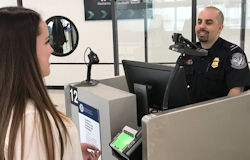|
WSJ Article: Worries about Facial Recognition
Business Groups Push Back Against Proposed Facial-Recognition Bans
'Moratorium on the use of facial recognition technology would be
premature and have unintended consequences’
 The
corporate sector is working to influence how facial-recognition tools are
regulated, spooked by local bans on government agencies’ use of the technology
and lawmakers’ proposals for nationwide restrictions. The
corporate sector is working to influence how facial-recognition tools are
regulated, spooked by local bans on government agencies’ use of the technology
and lawmakers’ proposals for nationwide restrictions.
The issue is a talking point among Democratic presidential candidates. Sen.
Bernie Sanders (I., Vt.) has called for a nationwide ban on police use of facial
recognition. Sen. Elizabeth Warren (D., Mass.) and Sen. Kamala Harris (D.,
Calif.) have both called for regulations on facial-recognition technology as
part of their criminal-justice platforms.
Also worrying for corporations is a bill that Sen. Roy Blunt (R., Mo.) and Sen.
Brian Schatz (D., Hawaii) introduced in March. The Commercial Facial Recognition
Privacy Act would limit companies’ ability to share facial-recognition data and
would prohibit the use of the technology unless a business obtains consent from
the people it is used on and provides notice and documentation explaining how
the technology works. The bill hasn’t made it to a committee vote.
 Nine
industry groups—including the U.S. Chamber of Commerce, the Security Industry
Association and the American Association of Airport Executives—sent a letter
dated Oct. 16 to more than a dozen House and Senate lawmakers urging them not to
support strict limits on the use of facial-recognition technology. Nine
industry groups—including the U.S. Chamber of Commerce, the Security Industry
Association and the American Association of Airport Executives—sent a letter
dated Oct. 16 to more than a dozen House and Senate lawmakers urging them not to
support strict limits on the use of facial-recognition technology.
“[W]e are concerned that a moratorium on the use of facial recognition
technology would be premature and have unintended consequences not only for
innovation, safety, and security but for the continued improvement of the
technology’s accuracy and effectiveness,” the letter said.
Retailers, airports, stadiums and other businesses have already started rolling
out facial-recognition tools to improve security and speed up customer
check-ins.
“We’re not opposed to regulation, but we oppose a ban,” said Tim Day, senior
vice president of the Chamber of Commerce’s Technology Engagement Center. “There
should be guardrails in place to allow the technology to move forward in a smart
way.”
The Chamber has convened a facial-recognition working group of about 40
companies from sectors including retail and transportation. The group plans to
release model legislation for facial recognition by year-end and to lobby
lawmakers to draft and vote for laws that are in line with those guidelines, Mr.
Day said.
San Francisco; Oakland, Calif.; and Somerville, Mass., have passed laws banning
government agencies from using the technology.
California has prohibited facial-recognition software in police body cameras:
Gov. Gavin Newsom, a Democrat, signed the bill into law this month. The
legislation, which becomes effective in January and expires after three years,
doesn’t apply to the private sector.
Some companies, meanwhile, are pointing to the benefits that facial recognition
brings.
Miami International Airport, which is affiliated with Airports Council
International—North America, has cut passenger screening wait times by up to 80%
over the past year, thanks in part to a biometrics-only concourse screening
facility, according to a Miami-Dade Aviation Department spokesman.
 In
January, the airport started using the technology for entry screening on up to
10 international flights a day, and it is testing facial recognition for
boarding on “a few daily flights,” the spokesman said. The plan is to eventually
expand both programs airport-wide. In
January, the airport started using the technology for entry screening on up to
10 international flights a day, and it is testing facial recognition for
boarding on “a few daily flights,” the spokesman said. The plan is to eventually
expand both programs airport-wide.
Such programs would be hampered if facial recognition bans were passed, Mr. Day
said.
In Europe, laws such as the General Data Protection Regulation, which prohibits
companies from processing facial-recognition data unless certain circumstances
apply, have slowed and in some cases halted the rollout of the technology, said
Heikki Koski, chief digital officer at Finavia, the state-owned operator of 21
Finnish airports.
Helsinki Airport is undergoing a €1 billion ($1.11 billion) expansion set to be
completed in 2022, and it is considering using facial recognition in new
check-in and security facilities, Mr. Koski said. But aviation officials haven’t
decided whether to proceed because of the challenges of complying with strict
data-privacy laws.
Under the GDPR, organizations can be fined up to €20 million or 4% of global
annual revenue, whichever is larger. In August, the Swedish Data Protection
Authority fined a municipality about €20,000 for conducting a facial-recognition
pilot to keep track of students’ school attendance.
The Swedish authority found that the pilot violated the GDPR. The school failed
to perform an adequate impact assessment and consult with Swedish privacy
authorities before processing biometric data, it said. Consent from the students
wasn’t valid, it added, because of the “clear imbalance” between the students
and the school.
“There are many obstacles to solve before we will see widespread implementation
here,” Mr. Koski said.
Article originally published on
wsj.com
|